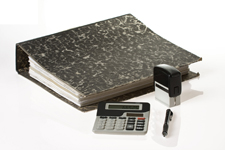Contents
Last updated: May. 13, 2013
 In an earlier blog post we wrote about the importance of getting started early with your tax planning.
In an earlier blog post we wrote about the importance of getting started early with your tax planning.
One of the key aspects of early tax planning you’ll need to consider is your company’s bookkeeping, or record keeping.
Bookkeeping refers to the organization and storage of accounting and financial documents such as ledgers, journals, financial statements, income tax records, and more.
In part one of a two-part series, we expand upon why record keeping and bookkeeping is important for your business. In part two, we offer some tips on how to get started with your own bookkeeping.
So, why is bookkeeping so important, anyway?
1. Avoid a CRA Audit
In 2010, 14% of small businesses were audited by the Canada Revenue Agency (CRA) and this may just be the tip of the iceberg as the 2013 Federal Budget announced an additional $100 million toward CRA compliance programs. In other words, more money is available to audit you.
Want to avoid an audit? Do your books. Messy records and books are one of the audit triggers that could get you audited. Learn what are the other top 6 audit triggers to avoid.
2. Limit the Pain of an Audit
In the unfortunate case that you are audited, if your books are in good order, the CRA will be able to finish quicker letting you get back to work sooner.
And, this is important because on average a company loses 61.6 hours complying with CRA auditors.
3. Dodge CRA penalties and sanctions
The CRA advises that if you don’t keep adequate records or don’t provide them access to your records, you may face penalties and/or sanctions.
4. Make Sure You’re Not Missing Deductions
Sloppy bookkeeping may lead to overlooking legitimate tax deductions. Or, the CRA may disallow your deductions unless you have the required paperwork.
The rule of thumb in any tax assessment is the CRA is right and you are wrong – unless your records prove otherwise.
5. Save Time When You File
We all know the usual tax season routine. When the time comes to file your year-end taxes or submit your GST/HST remittance, you do the last minute scramble to find all that paperwork. Why not avoid this headache by recording transactions as you go.
6. Keep a Clear Picture of your Company’s Financial Health
If you don’t have an accurate handle on your business income and expenses, how do you know if you’re actually making money? Monitoring cash in and cash out can help you make better decisions — before it’s too late.
Besides, when it comes time to sell your business or secure capital to grow your business, being able to thoroughly document your past performance will help your company’s valuation.
|

